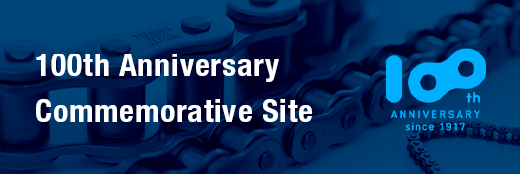Quality Management (Customers)
Basic Concept
Based on the Tsubaki Spirit corporate philosophy, the Tsubaki Group is dedicated to maintaining and improving the Tsubaki brand as a manufacturing company through the pursuit of superior quality and thorough quality assurance.
Basic Quality Policy
We do not pass defects on to the subsequent job process. We will all follow the rules, and make quality products.
Established: December 2001
Revised: October 2018
Our Basic Quality Policy adheres to the following principles.
- We will reaffirm our focus on our customers.
- We will apply the concept of ‘zero defects’ to our own work, and not pass any defects along to the next process, thereby ensuring quality each step of the way.
- We declare that every single person within the organization will have a sense of ownership and do a great job.
- We will look back to our founding principle of “making quality products” and start a new page in Tsubaki history.
“Making Quality Products” as the Starting Point of Manufacturing
Our founder, Setsuzo Tsubakimoto, began manufacturing chains in 1917. When he was excited but had misgivings about the development of a new business, he would remember something that the president of the spinning company that he worked at previously told him when he quit: “Make quality products.” No matter what you’re making, make quality products. Our founder took this lesson firmly to heart and made sure all his employees knew it. This determination made a century ago marked the inception of our manufacturing legacy, which continues to be ingrained in our DNA to this day.
System for Promoting Quality Management
We have established a system for promoting quality management led by the Tsubaki Group Quality Committee.
In April 2018, to further ensure the effectiveness of these efforts, we established the Quality and Environmental Promotion Department (Current the Quality Assurance Department) as a headquarters operations overseeing the entire Group, and the Quality Managers Committee as a cross-organizational implementation body.
In addition to traditional quality control assurance activities in each division, the Company conducts audits from a third-party perspective, formulates Group quality guidelines, and implements cross-organizational activities to improve quality. Through such methods, we not only aim for zero defects in quality but also to strengthen our system and abide by our promises to our customers. In doing so, we are strengthening the governance of quality management while maintaining and improving the Tsubaki brand.
-
System for Promoting Group Quality Management
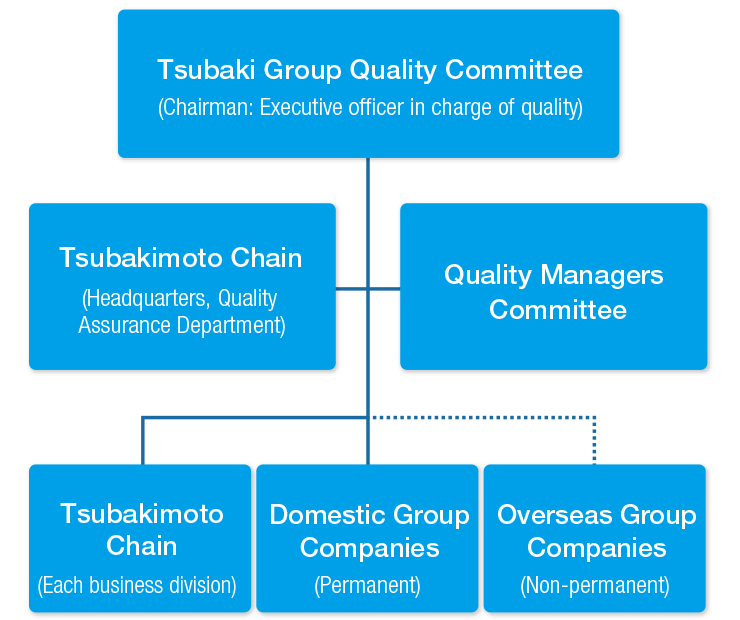
-
Framework for Strengthening the Quality Management System
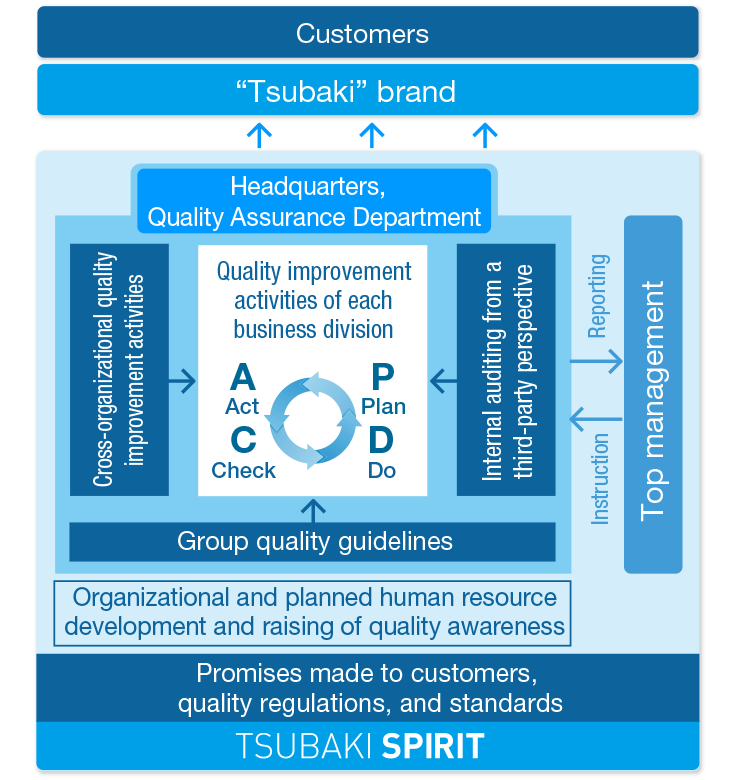
Quality Management System
The Group has obtained ISO 9001 certification, the international standard for quality management systems, at its manufacturing bases in Japan and overseas. As such, we have established a framework for quality management based on the ISO.
Quality Education and Human Resource Interactions
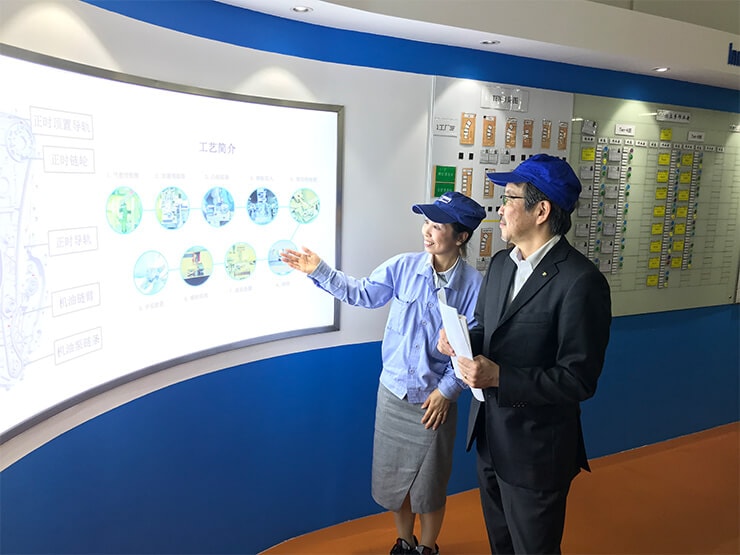
The Group aims to improve quality management skills by developing level-specific education on “quality” and “improvement” in its Companywide educational system. As we move forward, we will enhance quality specialist education centered on the Quality Assurance Department, such as providing education on statistical methodology, nurturing lecturers, and promoting the acquisition of quality control examination certificates as well as implementing initiatives such as fieldwork for quality training participants from Group companies for a period of one or two years. At the same time, we are introducing “individual quality targets” and “quality model factory” systems aimed at raising quality awareness of all employees.
Principal Initiatives for FY 2022
The 24th KAIZEN Conference: Ten Selected Circle Teams from Japan and Other Countries Presented Their Case Studies of Improvement
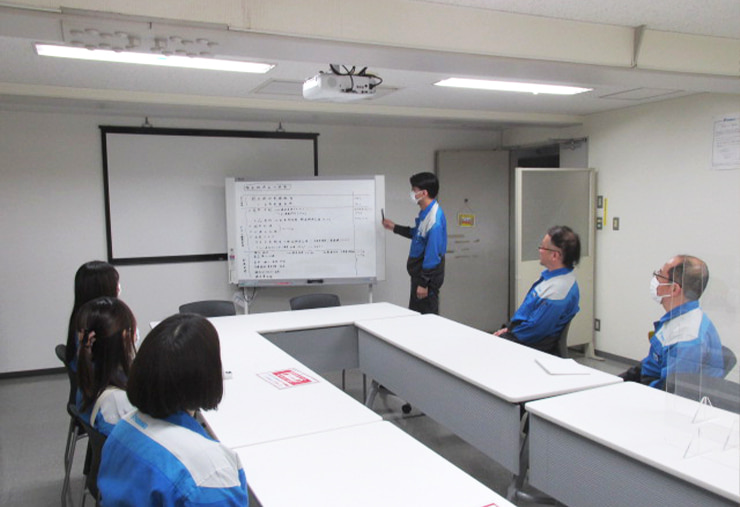
We held the 24th Tsubaki Group KAIZEN Conference in March 2023. As the COVID-19 pandemic was still ongoing, this time it was also streamed online. In addition to a message from the President and the presentations of improvement case studies by the 10 selected circle teams from Japan and overseas, we also introduced online (general release) the ONE TSUBAKI Improvement Proposal System. The judges awarded the Judges’ Special Award to the Chain Production Department Team for their efforts in reducing indirect tasks and measures to prevent human error.
The driving force of the Group’s growth is our employees’ high awareness of the issues involved in their assigned work and their eagerness to continuously take on the challenge of KAIZEN.
Quality Award Received from Global Automobile Manufacturers
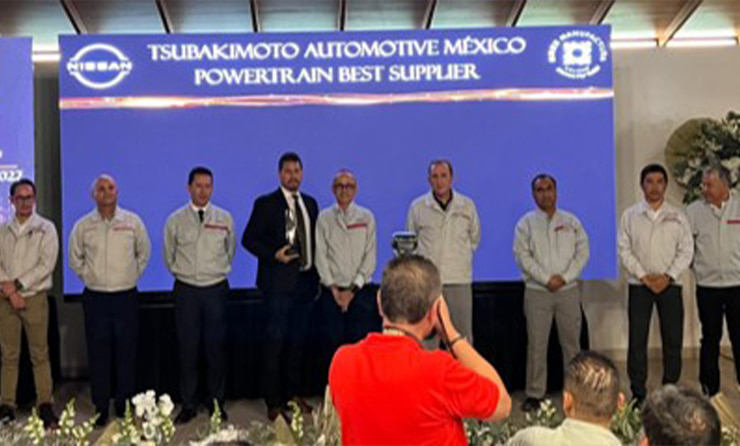
In the Mobility Business, we received an award from automobile manufacturers for our quality, delivery, and service performance as a supplier. In FY 2022, Tsubaki Group companies in Mexico, the United States, and Thailand received a total of 17 quality awards.
Tsubakimoto Automotive Mexico is awarded PWT Best Supplier from Nissan Mexico. We were comprehensively evaluated on QCD, and selected as the best supplier among 62 suppliers of power trains.
Providing Guidance on Quality to Overseas Bases Using MR (Mixed Reality)
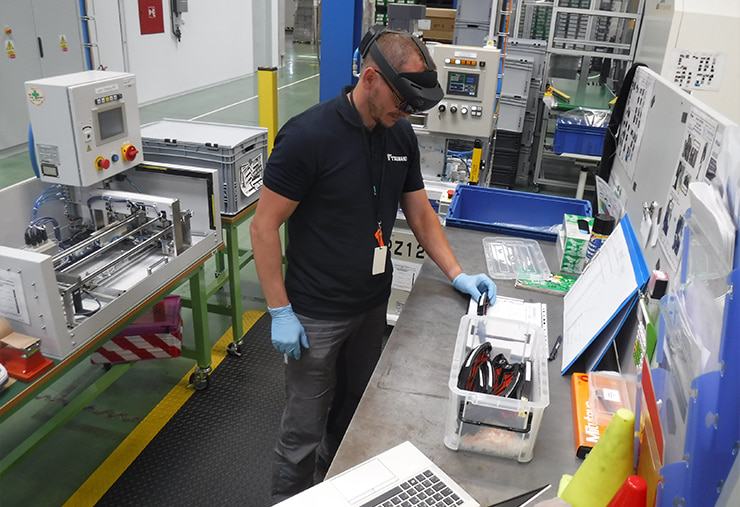
In our Mobility Business, which extends across eight countries and encompasses 14 factory systems worldwide, we ensure consistent global quality by dispatching instructors from the Saitama Plant to our overseas subsidiaries and welcoming apprentices to the Saitama Plant. Amid the COVID-19 pandemic, when international travel was restricted, and remote meetings became commonplace, we innovatively utilized MR (mixed reality) goggle-type devices to create an even more immersive virtual environment based on the 3-Gen Principles: Genchi (local), Genba (on site), and Genbutsu (actual item). Using these devices, we were able to connect the Saitama Plant with overseas business sites and share what each side was seeing and saying, allowing the employees to check the actions being done in real time, as if the work was actually happening in front of them.
We are presently employing diverse features and broadening our scope of applications to encompass remote process audits and inspector training, as well as addressing unforeseen incidents at production sites and managing various processes. Another advantage of these devices is that by linking them to a remote meeting system, we can share information with multiple people in real time.
It is now possible to travel overseas for business, so we will combine the use of MR with face-to-face communication, and keep strengthening mutual cooperation in the Tsubaki Group.


